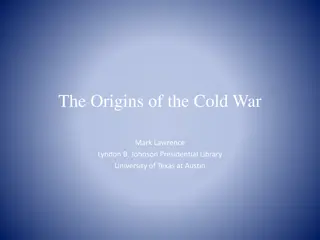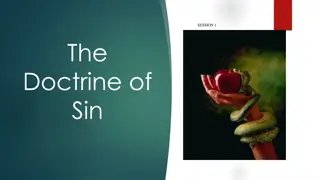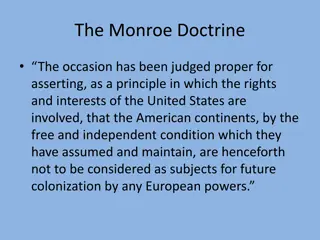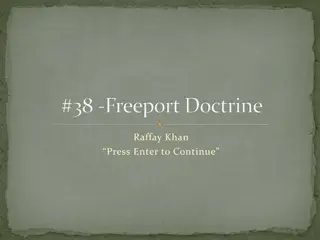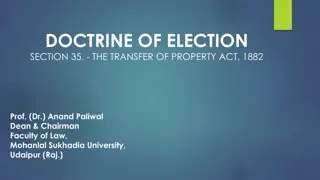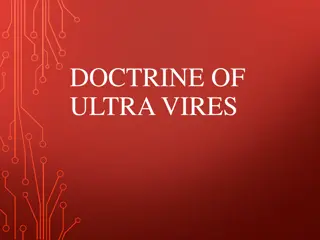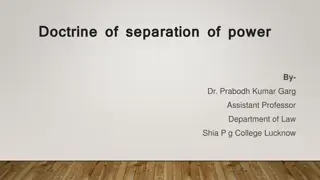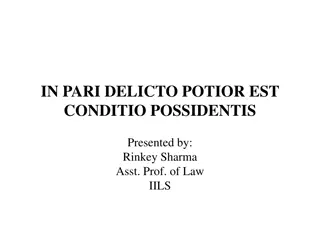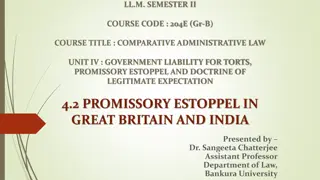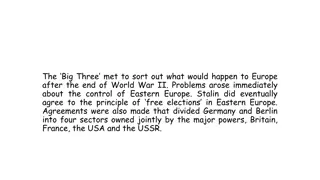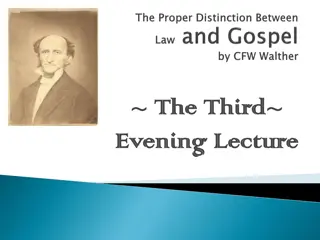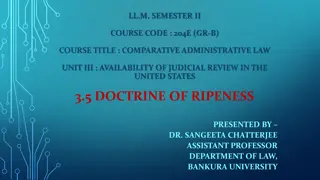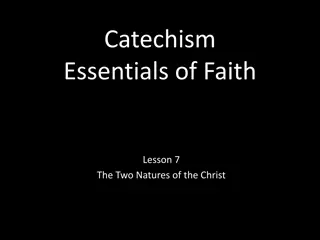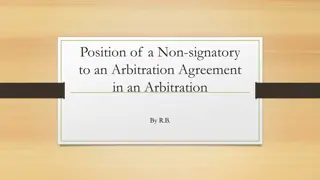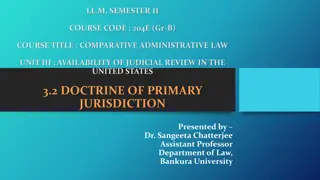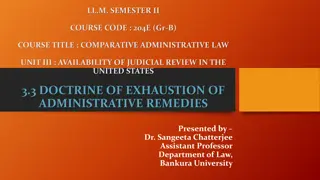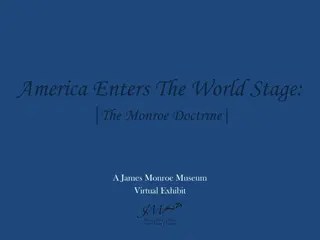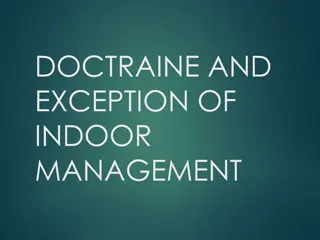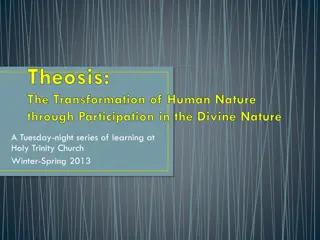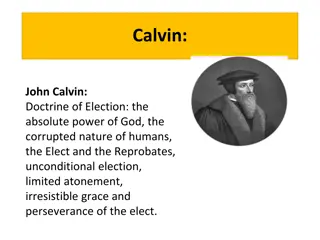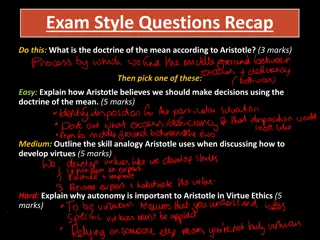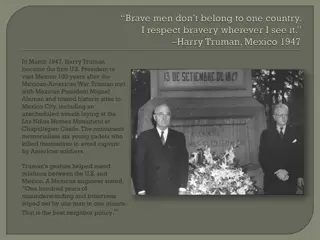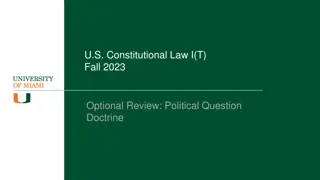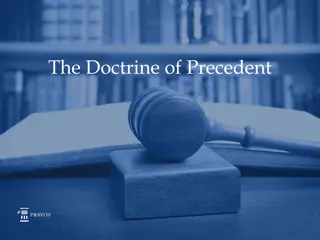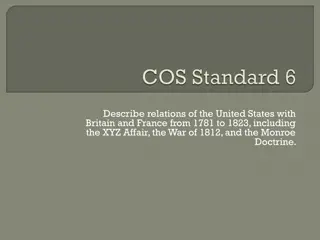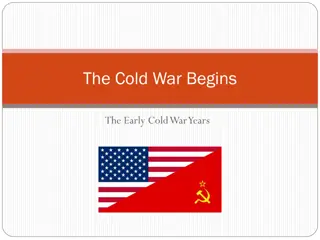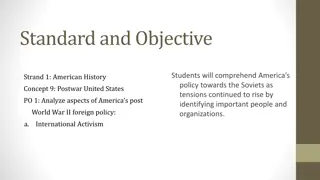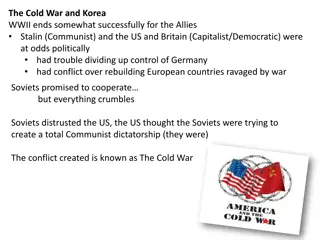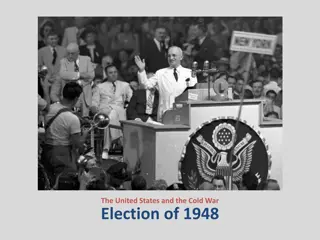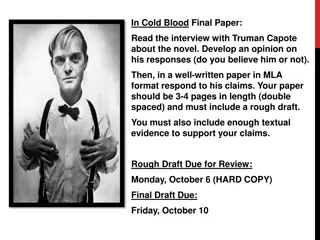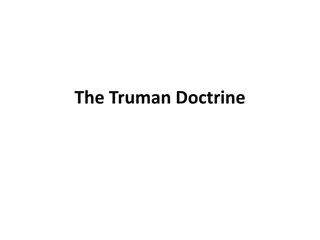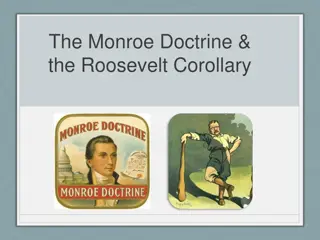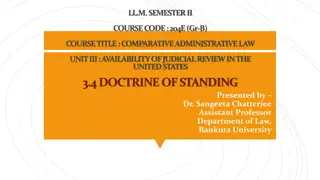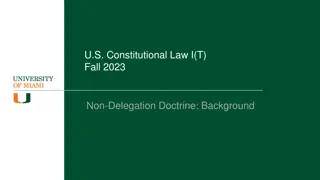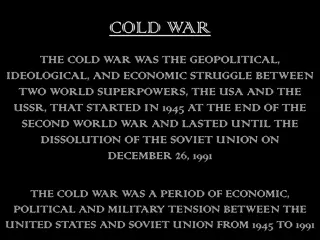The Origins of the Cold War and U.S.-Soviet Antagonism
Amid post-World War II developments and contrasting ideologies, the Cold War emerged, marked by Yalta and Potsdam Conferences, the Truman Doctrine, the Marshall Plan, the Berlin Blockade, NATO's formation, and more. Various perspectives exist on the roots of U.S.-Soviet tensions, with the Soviet vis
1 views • 16 slides
Understanding the Doctrine of Sin in Christian Theology
Explore the profound impact of sin as a transgression against God's holiness, its existence, extent, consequences, and common misunderstandings. Delve into biblical references on sin's definition and the origin of evil in the world. Gain insight into the significance of doctrine in aligning beliefs
1 views • 18 slides
The Monroe Doctrine: A Declaration of American Independence
The Monroe Doctrine asserts that the American continents are not to be colonized by European powers and considers attempts to extend European systems into the hemisphere as dangerous. The United States declares its non-interference with existing European colonies or dependencies.
0 views • 8 slides
The Freeport Doctrine and Stephen Douglas: A Historical Overview
Explore the history of the Freeport Doctrine as articulated by Stephen Douglas during his debate with Abraham Lincoln. Learn about Douglas's views on slavery, popular sovereignty, and the implications of the doctrine on territorial governance. Delve into the background, significance, and relations t
1 views • 10 slides
Doctrine of Election under Section 35 of the Transfer of Property Act, 1882
The doctrine of election under Section 35 of the Transfer of Property Act, 1882 deals with situations where a person professes to transfer property he does not own, and the owner must elect to confirm or dissent. If the transfer is gratuitous and the transferor is unable to make a fresh transfer, th
5 views • 17 slides
Understanding the Doctrine of Ultra Vires in Company Law
The doctrine of ultra vires in company law pertains to acts that are beyond a company's legal powers or authority as stated in its memorandum of association. This concept categorizes acts as ultra vires the directors, articles of association, or the company itself, with implications such as void con
1 views • 11 slides
Understanding the Doctrine of Separation of Power by Dr. Prabodh Kumar Garg
The doctrine of separation of power, as elucidated by Dr. Prabodh Kumar Garg, emphasizes the distinct roles of the executive, legislative, and judiciary branches to maintain checks and balances in governance. Originated by Montesquieu, this principle safeguards against tyranny and ensures liberty by
0 views • 27 slides
Doctrine of In Pari Delicto in Legal Context
The doctrine of in pari delicto (Latin for "in equal fault") dictates that when parties are equally at fault, the possessor's condition is considered better, meaning a person engaged in wrongdoing cannot sue another for the same act. Exceptions include the adverse interest and innocent insider excep
0 views • 4 slides
Understanding Marshalling of Securities in Mortgage Law
Marshalling of Securities, as per Section 81 of the Transfer of Property Act, addresses the scenario where a property owner mortgages properties to different individuals. This doctrine ensures subsequent mortgagees are entitled to have debts satisfied from properties not mortgaged to them while prot
0 views • 20 slides
Understanding Promissory Estoppel in Comparative Administrative Law
Estoppel and specifically Promissory Estoppel have evolved as important legal doctrines to prevent injustice and ensure that promises made are upheld. This concept is explored in the context of administrative law, particularly looking at government liability for torts, the doctrine of legitimate exp
0 views • 12 slides
Post-World War II Division and Cold War Tensions in Europe
Big Three leaders post-World War II agreement on Eastern Europe control, division of Germany, Truman confronting Stalin, atomic bombings, USSR's influence in Eastern Bloc, Truman Doctrine against communism, US financial aid to combat communism in Europe.
5 views • 26 slides
Army Leadership Doctrine Update: ADP 6-22.1 Highlights
New Army Doctrine Publication (ADP) 6-22.1, "Army Leadership and the Profession," emphasizes the foundational principles of leadership with updated content and guidance. It covers essential leadership traits, values, competencies, and behaviors, providing insights into effective leadership practices
1 views • 6 slides
Understanding the Difference Between Law and Gospel in Doctrine
Exploring the critical distinction between the Law and the Gospel in Christian doctrine, this content emphasizes the diverse roles each plays in addressing spiritual needs. It warns against the dangers of false doctrine and highlights how the Gospel offers comfort while the Law exposes sin. The impo
1 views • 25 slides
Understanding the Doctrine of Ripeness in Judicial Review
The doctrine of ripeness in judicial review focuses on the timing of court intervention, ensuring that cases are mature enough for adjudication. It aims to prevent premature decisions and conflicts with other branches of government, emphasizing the need for cases to be fit for judicial review before
0 views • 12 slides
Understanding the Two Natures of Jesus Christ in Christian Doctrine
The concept of the two natures of Jesus Christ, divine and human, is explored through various biblical references and historical heresies such as Docetism. The struggles over the doctrine of the Trinity and the nature of Christ are interconnected, emphasizing the importance of understanding Christ's
6 views • 13 slides
The Doctrine of Privity and Non-signatory in Arbitration
The Doctrine of Privity in contract law states that only parties to a contract can enforce its terms, excluding third-party beneficiaries. However, in certain cases, such as piercing the corporate veil or involving group companies, non-signatory affiliates may be bound by an arbitration agreement. T
5 views • 16 slides
Understanding Doctrine of Primary Jurisdiction in Comparative Administrative Law
The doctrine of primary jurisdiction plays a crucial role in determining whether a court should yield to an administrative agency for certain issues. It helps in deciding which tribunal should take the initial action, especially in cases involving administrative discretion. This doctrine allows cour
1 views • 14 slides
Doctrine of Exhaustion of Administrative Remedies in Comparative Administrative Law
The doctrine of exhaustion of administrative remedies requires litigants to pursue all available remedies with administrative authorities before seeking judicial review. Originating from the case of Myers v. Bethlehem Shipbuilding Corp, this doctrine aims to respect congressional intent and promote
1 views • 12 slides
Overview of the Cold War: Tensions, Divisions, and Key Events
The Cold War was characterized by the rocky relationship between the U.S. and the Soviet Union, the division of Germany and Poland, the concept of the Iron Curtain, the Truman Doctrine, military alliances like NATO and the Warsaw Pact, and the political dynamics of the Korean War. Tensions over diff
0 views • 17 slides
America Enters the World Stage: The Monroe Doctrine Virtual Exhibit
James Monroe's significant impact on American foreign policy, particularly through the Monroe Doctrine, is showcased in a virtual exhibit exploring his presidency and diplomatic legacy. From the Monroes' ambassadorial attire in Paris to the historical context of the doctrine's proclamation, delve in
1 views • 20 slides
Understanding the Doctrine of Indoor Management
Doctrine of indoor management implies that a company's internal affairs are its responsibility, allowing outsiders to assume that directors act within their apparent authority. This doctrine, originating from the case of Royal British v/s Turquand, protects outsiders under certain conditions. Constr
0 views • 11 slides
Theosis: The Transformation of Human Nature in Christian Doctrine
Explore the concept of theosis, the transformation of human nature through participation in the divine nature, as seen in Biblical foundations such as Genesis, Psalms, and New Testament writings. Delve into questions about the development of this doctrine, its manifestation in worship, and its relev
2 views • 30 slides
John Calvin's Doctrine of Predestination: A Summary
John Calvin's doctrine of predestination revolves around the absolute power of God, the corrupted nature of humans due to original sin, and the concepts of the Elect and the Reprobates. Calvin believed in unconditional election, limited atonement, irresistible grace, and the perseverance of the elec
0 views • 21 slides
Symbolism and Semiotics in "The Truman Show
The Truman Show utilizes semiotics and symbolism to convey deeper meanings throughout the film. From the index that hints at the fabricated reality to the symbol of the sea representing confinement and freedom, each element plays a significant role in unraveling Truman's journey. The revolving door
0 views • 7 slides
Understanding Aristotle's Doctrine of the Mean and Voluntary Actions
Explore Aristotle's doctrine of the mean, the skill analogy used in developing virtues, the importance of autonomy in virtue ethics, and the distinction between voluntary and involuntary actions in moral responsibility as discussed in his Nicomachean Ethics.
0 views • 22 slides
Harry Truman's Historic Visit to Mexico in March 1947
In March 1947, President Harry Truman visited Mexico, marking the first visit by a U.S. President since the Mexican-American War. Truman's gesture at the Los Niños Heroes Monument helped mend relations between the two countries. The visit included meetings with Mexican officials, tours of historic
0 views • 9 slides
Understanding Political Question Doctrine in U.S. Constitutional Law
Explore the intricacies of the Political Question Doctrine in U.S. Constitutional Law, focusing on key aspects such as textually demonstrable commitment, lack of judicially manageable standards, and the impact of standing on legal cases. Scholars debate whether the doctrine is jurisdictional and its
0 views • 20 slides
Post-WWII America: Progress, Politics, and the Election of 1948
Lakewood, California's post-WWII boom symbolized the era's prosperity and status symbol of homeownership. Truman's Fair Deal faced Republican opposition, leading to postwar political shifts, including the 22nd Amendment and Taft-Hartley Act. The Election of 1948 saw Truman navigating Democratic fact
0 views • 20 slides
Understanding the Doctrine of Precedent in the UK Legal System
The doctrine of precedent, also known as stare decisis, is a fundamental principle in the UK legal system that requires courts to follow previous decisions on similar facts. This system ensures consistency and predictability in the application of law. The hierarchy of courts dictates the binding nat
0 views • 21 slides
The United States Relations with Britain and France from 1781 to 1823
The relations of the United States with Britain and France from 1781 to 1823 were marked by significant events such as the XYZ Affair, the War of 1812, and the Monroe Doctrine. The XYZ Affair strained relations with France, while the War of 1812 saw conflicts with Britain, including the burning of W
0 views • 27 slides
The Cold War Begins: Early Years and Containment Policies
The early years of the Cold War marked by conflicts between the United States and the Soviet Union, shaped by policies like the Long Telegram, Containment, Truman Doctrine, and the Marshall Plan. Tensions escalated with events such as the Crisis in Iran and the Berlin Crisis as the world grappled wi
0 views • 21 slides
America's Policy Towards Soviets in the Early Cold War Years
The early Cold War period saw heightened tensions between America and the Soviets, with key events like the Long Telegram and Crisis in Iran shaping America's containment policy. Diplomat George Kennan's Long Telegram highlighted Soviet insecurity, leading to the policy of containment. Crisis in Ira
0 views • 13 slides
The Cold War and Its Impact: Truman Doctrine, Marshall Plan, and Iron Curtain
The Cold War emerged from the tensions between the Communist Soviet Union and the Capitalist Democratic US and its allies after WWII. The conflict led to the Western Bloc led by the US and the Eastern Bloc led by the Soviets. The US implemented the Truman Doctrine and Policy of Containment to preven
0 views • 14 slides
The Election of 1948: Cold War, Truman, and Dixiecrats
The Election of 1948 was significant due to its context in the Cold War era, Truman's presidency, and the emergence of Dixiecrats. The Cold War, Truman Doctrine, Marshall Plan, and containment policy shaped the political landscape. Truman, Wallace, Dewey, and Thurmond were key candidates with contra
0 views • 8 slides
Analyzing Truman Capote's Statements in "In Cold Blood" Interview
Analysis of Truman Capote's responses in an interview regarding his novel "In Cold Blood." Explore the credibility of Capote's claims and provide a well-reasoned opinion supported by textual evidence.
0 views • 6 slides
The Cold War Events: Truman Doctrine, Marshall Plan, Berlin Airlift, American Responses, NATO & Warsaw Pact
The Cold War era saw significant events such as the Truman Doctrine, where the US aimed to support free peoples against communism. The Marshall Plan and the Berlin Airlift helped in the recovery of Europe post-WWII. American responses included the creation of CIA, NSC, and the Department of Defense.
0 views • 11 slides
The Monroe Doctrine and the Roosevelt Corollary: Evolution of US Foreign Policy
The content explores the historical context and evolution of US foreign policy through the Monroe Doctrine of 1823 and the Roosevelt Corollary of 1904. It discusses the principles outlined in each doctrine, their implications on US interactions with other nations in the Western Hemisphere, and the s
0 views • 4 slides
Understanding the Doctrine of Standing in US Judicial Review
The doctrine of standing in United States judicial review is explained, focusing on the capacity of a plaintiff to seek judicial review based on injury-in-fact, causation, and redressability. The requirements of the standing doctrine and its relation to Article III of the US Constitution are discuss
0 views • 12 slides
U.S. Constitutional Law I(T) Fall 2023: Non-Delegation Doctrine Overview
Exploring the Non-Delegation Doctrine in U.S. Constitutional Law, this content delves into the background, current doctrine, historical cases, and contextual considerations related to congressional delegation of regulatory powers. It addresses the constitutionality of Congress authorizing bodies suc
0 views • 46 slides
The Cold War: A Geopolitical Struggle Between Superpowers
The Cold War was a significant period of tension between the USA and USSR from 1945 to 1991, marked by ideological differences, fear of attacks, and military posturing. Key events such as the Yalta Conference, formation of the United Nations, and strategies like the Truman Doctrine and Marshall Plan
0 views • 10 slides
